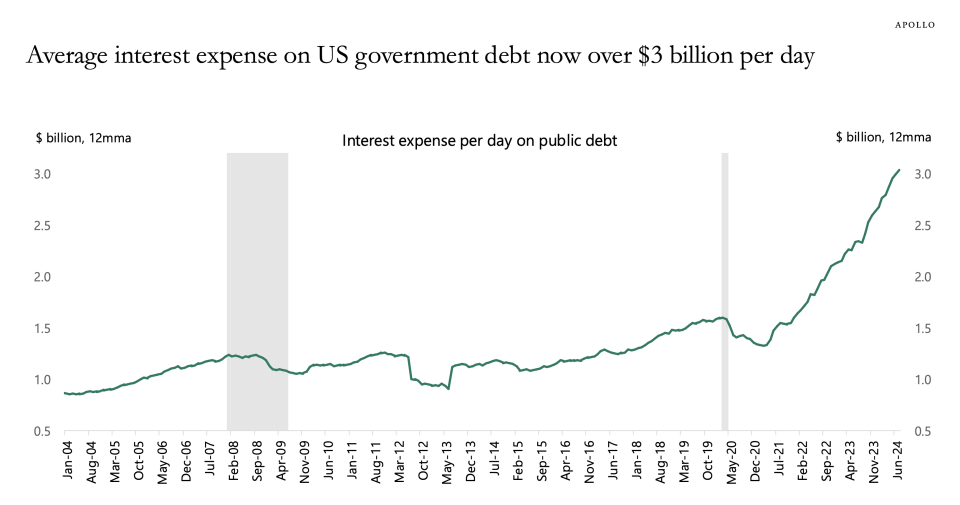With U.S. debt now at $35.3 trillion, the cost of paying the interest on all that borrowing has soared recently and now averages out to $3 billion a day, according to Apollo chief economist Torsten Sløk.
And that includes Saturdays and Sundays, he pointed out in a note on Tuesday.
The daily interest expense has doubled since 2020 and is up from $2 trillion about two years ago. That’s when the Federal Reserve began its campaign of aggressive rate hikes to rein in inflation.
In the process, that made servicing U.S. debt more costly as Treasury bonds paid out higher yields. But with the Fed now poised to start cutting rates later this month, the reverse can happen.
“If the Fed cuts interest rates by 1%-point and the entire yield curve declines by 1%-point, then daily interest expenses will decline from $3 billion per day to $2.5 billion per day,” Sløk estimated.

Meanwhile, the federal government closes out its fiscal year at the end of this month, and the year-to-date cost of paying interest on U.S. debt was already at $1 trillion months ago.
But even if Fed rate cuts lighten the burden on interest payments, the next president is expected to worsen budget deficits, adding to the pile of total debt and offsetting some of the benefit of lower rates.
In fact, a recent analysis from the Penn Wharton Budget Model found that the deficit will expand under either Donald Trump or Kamala Harris.
But there’s a big difference between the two.
Under Trump’s tax and spending proposals, primary deficits would increase by $5.8 trillion over the next 10 years on a conventional basis and by $4.1 trillion on a dynamic basis that includes the economic effects of the fiscal policy.
Under a Harris administration, primary deficits would increase by $1.2 trillion over the next 10 years on a conventional basis and by $2 trillion on a dynamic basis.
Still, JPMorgan analysts called the outlook unsustainable, regardless of who wins the presidential election, while acknowledging the prospect of bigger deficits with Trump.
“Irrespective of the election outcome, the trend since the pandemic has been profligate fiscal policy that is absorbing substantial amounts of capital and is incentivizing additional private investment,” the bank said. “At the same time, the en masse retirement of baby boomers is shifting a substantial share of the population from a high-savings period in life to a low-savings period, depressing the supply of capital.”
This story was originally featured on Fortune.com
